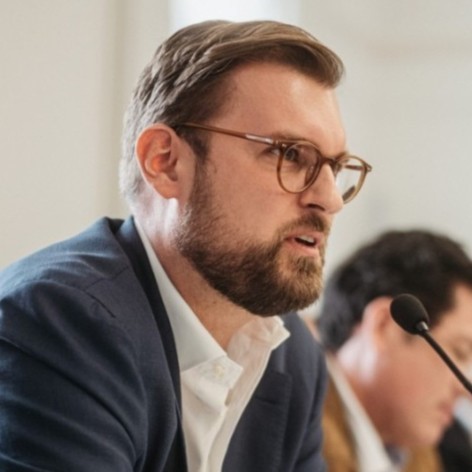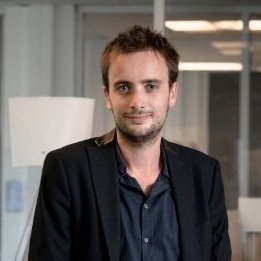Enabling sustainability transition across organisations
Video
.
Pontoon Instinct is our speciality advisory service. As part of the ESG & Impact practice, we support strategic people functions in delivering the human capital component of their organisations’ ESG, connect them to their people’s purpose and enable sustainability transition.
Early in 2023, Pontoon and AXA Climate, part of AXA – the multinational insurance company – joined forces to showcase the Climate School, a solution to build awareness around the impacts of climate change on businesses and employees’ jobs. With the Climate School, Pontoon and AXA Climate seek to broadly address the subject of climate through an online learning experience of 150+ fully-customisable microlearning chapters meant to engage and upskill employees in businesses’ sustainable transition.

Frederik Otto, Head of Client ESG & Impact, Co-Lead Global Workforce Strategy
In this video, Pontoon’s Head of Client ESG & Impact – Frederik Otto – speaks with AXA Climate’s VP for the Climate Schoool –Antoine Poincaré – on the sustainability transition and how it impacts people, jobs, organisations and the world we live in.
Frederik Otto: What is the impact of the environmental component on the human capital agenda? What does climate change mean to organisations?

Antoine Poincaré, VP AXA Climate for the Climate School
Antoine Poincaré: There are two big components to understand as a company when facing climate change. One is mitigation, and the other is adaptation, and you need to think of both simultaneously. Mitigation is the stuff everybody talks about – how we reduce our impact on the environment, how we reduce our greenhouse gas emissions? And that has a significant implication because it means that we will need to stop some activities while being able to accelerate others. Here is also where the people challenge starts. Organisations must consider if their actions are compatible with a world operating within certain planetary boundaries, the world of finite resources. Then there’s the adaptation bit – the climate is already warming, so how do you align and protect yourself as an organisation against that? And it also impacts human capital massively because you need to look at health and safety and how you protect your people. We always think about protecting the goods and making the company run, but this includes people.
Frederik Otto: What is precisely the impact on individual jobs? Do you think there is a difference between whether you work in technology, HR, or legal? What is your outlook on how these roles will be affected by climate change in the future?
Antoine Poincaré: That’s the core, I would say, of our value proposition. When we started AXA Climate School to work with companies facing sustainable transition, we started with the science bits. So, what’s climate change, what’s biodiversity, why do you need to consider natural resources? Then the next step was around what’s in it for my company – carbon footprint, circular economy, having climate and biodiversity strategies etc. And then, we moved to another crucial component: the impact on some key jobs. We looked at exactly the type of jobs you mentioned, marketing, HR, finance, IT, legal departments, and facility management, all of those jobs that are going to be, and are already, impacted by the sustainable transition.
If we look at let’s say HR, you need to consider several angles – starting with anticipating green skills and new green jobs. Then you need to think how to promote your sustainability strategy among newcomers – there’s an employer branding focus. Another thing we cannot omit is the fact that there are more and more environmentally engaged employees – so, how my organisation adapts. And there is, of course, the issue of physical risk to people. How do you ensure that all of your people are safe when they come to work, in the world of more extreme weather conditions?
Frederik Otto: You mentioned lots of changes. You touched upon digital as well. That’s obviously a topic that we talk about a lot now – AI, an absolute game changer. We have climate change, we have inequality still rampant throughout the world. So considering all these things and looking towards a more sustainable future, some ask: “what are the green skills”, I would ask: “what are the sustainability skills of the future”? What is your advice to somebody in an early career? What do you think we all need to get our heads around to remain relevant in 20 years?
Antoine Poincaré: So it’s a tricky topic. When you look at what happened with digital transformation – we talked a lot back in the day about those new jobs that will be created around AI, VR, cryptocurrencies etc., and everybody was super excited by that. But now we are actually there, we are in the “jobs of the future moment” that we spoke of in 2010, the reality is a bit different. Of course, some people are in these new roles, however, in the organisations we work with, most workers are doing the same job – they are still in HR, purchasing, finance etc. What happened is, those “standard” jobs digitilised massively, and people that did not follow that transition may now have an employability problem.
I think it will happen in the same way with the green skills. Of course, there will be some jobs in renewables, maybe in nuclear power, that will be pretty new, but for companies, the big question is how do you ensure that the jobs that already exist within your company get green. It gets tricky here because a certain level of upskilling is required – you need to know how climate works, how to adjust biodiversity, what you need to have in terms of natural resources etc. So this kind of green culture shift is happening, but we have to be exact about how it impacts the existing jobs. For example, if you’re in the law department of a large company and you are not considering the litigation risks that any company today faces by deteriorating the environment, that probably puts your job in jeopardy in the future.
Frederik Otto: We talk a lot about career transition. Organisations come to us saying – I have this worker population in my organisation, they are not relevant to what they’re doing anymore, but we want to retain them through training on the other jobs. But what you’ve just said made me think that the foundation of what reskilling should entail will likely change in the future, right? So if you can think about building a solution now, it probably starts with a significant awareness piece around what’s happening right now, doesn’t it?
Antoine Poincaré: As AXA Climate School, we came up with a model that we call a one-hour, ten-hours, and hundred-hours model.
Everybody needs to understand what’s happening, and that’s the one-hour bit. In reality, it may be one hour, maybe two, maybe three, but you see the point – you need to get a bit smarter on the basics first.
Then we go into ten-hours, again can be 20 or 30, but this is about the actual upskilling. Okay, you’re an accountant, and now you want to know about the triple bottom line and acquire new skills that you’ll be able to sell on the market, that are going to your resumé.
And then there’s the hundred-hours bit which is about reskilling. Maybe you have a job that either you don’t like, or that’s coming to an end. For instance, in the automotive industry, certain skills will phase out by transitioning to electric, with some people out-skilled from the market.
What’s tricky about these models is that we have only one precedent in which they have worked so far – digital transformation. The massive reskilling opportunity that digital transformation created was driven mainly by everybody wanting to become a web developer or web engineer. Then it evolved, but at the beginning, there was a certain commonality in the type of jobs needed for that transformation.
Here, regarding reskilling, the needs differ massively depending on the area – CSR, eco-design, and so many more. We will need to build – collectively with schools, public authorities, and companies – the “schools for reskilling”, separate for each area – we will need a whole lot of them, as there’s little commonality in-between the fields, and this, I think, is a huge challenge.
Get in touch with us through the button below to see how we can help you enable sustainability transition across your organisation.
Related Post
Discover our groundbreaking approach to diversity and inclusion in our latest whitepaper.
Recent research by Harvard Business Review has shown that unrepresented job candidates are less interested in working for companies ...




